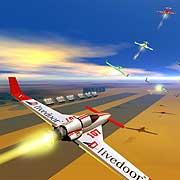10.03.2005
Rocket Racing on Earth
 Reminds you of Star Wars: Episode I -- The Phantom Menace, doesn't it?
Reminds you of Star Wars: Episode I -- The Phantom Menace, doesn't it?Flyers, gets your FAA rocket plane licenses and start your liquid oxygen/kerosene fueled X-Racer engines...
Vroooooooom. I missed the fanfare at the Yale Club here in downtown New York yesterday, but could have heard the wow's all the way across town as high-flying Dr. Peter H. Diamandis, founder of the X PRIZE, unveiled his latest airborne innovation: the Rocket Racing League.
Picture it:
Rocket races will operate much like auto races, with the exception that the 'track' is up in the sky. Courses are expected to be approximately two miles long, one mile wide, and about 5,000 feet high, running perpendicularly to spectators. The rocket planes, called X-Racers, will take off from a runway both in a staggered fashion and side-by side and fly a course based on the design of a Grand Prix competition, with long straight-aways, vertical ascents, and deep banks. Each pilot will follow his or her own virtual 'tunnel' or 'track' of space through which to fly, safely separated from their competitors by a few hundred feet.There'll be teams, sponsors, t-shirts, tours, advertising, a video game, lots more. The finals will happen each October in New Mexico at the X-Prize Cup.
Upon take-off, onlookers will easily follow the race as the rocket planes remain in view and sport 20-foot rocket plumes. Fans can also track their favorite pilots' progress via large screen televisions and hand-held GPS tracking devices using WiFi to stream video of the cockpit, live 'on-track' shots, 'side by side' views and wing angle views.
Fans at home will be treated to a three-dimensional course where the 'tracks' pilots are following can be seen. Special effects for lap completions, barrier violations and penalties will also be a part of the show.
Peter Diamandis is a genius.
Even the FAA's Patricia Smith is a fan of rocket racing. She said, "The FAA salutes the Rocket Racing League on its mission to usher in a new era in aerospace entertainment. We look forward to working with the RRL to secure all the necessary licenses and permits to ensure safe and exciting events for the public."
And not a moment too soon. After all, all work and no rocket racing would make for a pretty dull 21st century, wouldn't it?






